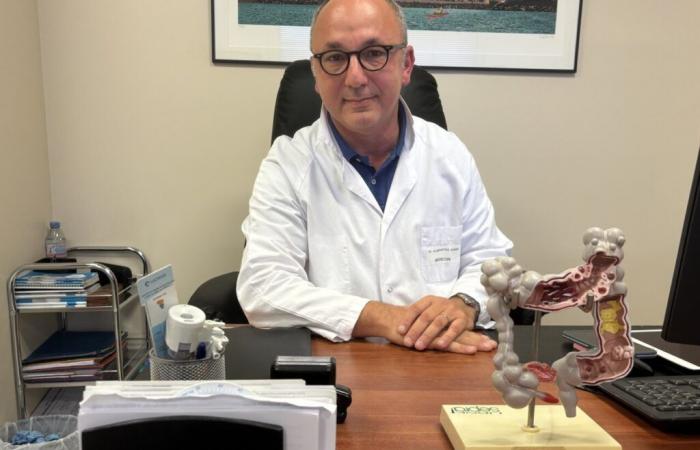Par
Julien Munoz
Published on
Nov 2, 2024 at 3:26 p.m.
See my news
Follow La Presse de la Manche
Boris Alamowitch, visceral and digestive surgeon, has been practicing for five and a half years at the Polyclinique du Cotentin, in Cherbourg-en-Cotentin (Manche). Time, already, to practice 220 interventions of bariatric surgery in Cotentin.
While the demand for obesity surgery continues to grow, that so-called “miracle” drugs are arriving on the territory and that certain internet influencers are pushing to do a little bit of everything and anything, he takes stock. “To be effective over time, fight against obesity must be supervised,” he says.
The increasingly frequent practice of surgery
The figures are worrying. A recent public health study places Normandy among the three regions most affected by obesity, behind the Nord and the Great East.
Access to bariatric surgery opens up a little more
I have been practicing this type of surgery since the end of the 90s. We now have significant hindsight and it is, over time, the most effective recourse. There is a substantial reduction in the cost of certain treatments that the patient had. It must be understood, however, that the operation is not a miracle. It’s not easy either. It takes a lot of courage for patients to make this choice.
In France, obesity surgery today represents approximately 450,000 operations per year, against 59 000 in 2016.
Sleeve gastrectomy (removal of two thirds of the stomach) is the most commonly practiced, well ahead of gastric bypass. The installation of a gastric bandwidely publicized in the early 2000s, is however almost no longer used. The gastric balloon is not recommended by the High Authority for Health (HAS) in the management of obesity.
Strict conditions of access to the operation… but relaxed
The access conditions are very strict, with a pre-operative course of at least six months, filled with medical and dietary appointments. It concerns adults over 18 years of age with significant obesity whose body mass index or BMI (calculated by dividing weight by height squared) is greater than 40 (massive obesity), as well as adults with a BMI greater than 35 (severe obesity).
To be eligible, they must have at least one pathology likely to be improved by surgery (type 2 diabetes, high blood pressure, sleep apnea syndrome, etc.).
In recent months, the latest HAS recommendations have evolved, for the first time in 15 years.
They open access to surgery to people over 65 years oldto patients with BMI between 30 and 35 who suffer from type 2 diabetes (in case of failure of properly followed drug treatment).
This is a major advance for the management of diabetes, a fairly common pathology, notes the surgeon. I think it’s a good thing. Some Nordic countries are far ahead on this.
THE herniasTHE disabling hernias and the liver fat overload become comorbidities taken into account for people with a BMI between 35 and 40.
The danger of medical tourism
These relaxations also respond to another reality. In recent years, patients who find themselves just below the eligibility criteria have chosen to leave have an operation abroad.
The medical tourism also concerns obesity.
There are notably Tunisia and Turkey, in the form of somewhat cosmetic vacation stays. I have already dissuaded a few patients from going abroad. This is done over a week. You end up with people having their stomachs cut out with BMIs of 30-31… It’s very risky. There is no preparation, they see the cardiologist and the anesthesiologist the same day. There is also no post-operative follow-up…
Very restricted access to medicines
Since last month, drugs indicated for the treatment of obesity have been marketed in France at a price freely set by the laboratory, without refund possible by Health Insurance. Injunction medications first indicated in the treatment of type 2 diabetes: GLP-1 analogues. Their role is to slow down the emptying of the stomach, to achieve satiety. And therefore, the blood sugar level.
It is not the miracle drug against obesity, as we can read here and there, The indications are extremely precise. It must be prescribed by endocrinologist-nutritionists doctors after six months to a year of dietary treatment, if this has failed. It’s not really for the general public. These are treatments which are not trivial in terms of complications: digestive, nausea, cardiac, biliary, etc.
The doctor believes that medications can be very useful in following up surgery.
After four to five years, there may be a small weight gain, controllable.
Follow all the news from your favorite cities and media by subscribing to Mon Actu.






